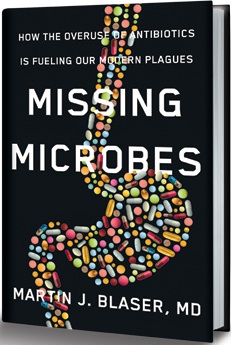
Bacteria were the sole living inhabitants on Earth for three billion years. They reproduce as quickly as every twelve minutes and have evolved in stunning diversity to fill every niche, including the human body. In fact, every person alive is host to around 100 trillion bacterial cells—outnumbering their human cells ten to one, and composing 99.9 percent of the unique genes in the body. All of this bacteria (about three pounds’ worth, approximately as heavy as the human brain) forms the microbiome, the complex—and crucially important—ecosystem of microorganisms on which we all depend. But what if the elaborate community of organisms that makes up the human microbiome was threatened? Martin J. Blaser, MD, the director of the Human Microbiome Program at New York University, spells out exactly that scenario in MISSING MICROBES: How the Overuse of Antibiotics Is Fueling Our Modern Plagues (Henry Holt and Company), and he doesn’t exaggerate the dangers.
In MISSING MICROBES, Blaser explains that the massive increases in the developed world of “modern plagues”—such as obesity, type 1 diabetes, asthma, allergies, esophageal cancer, celiac disease, Crohn’s disease, ulcerative colitis, and autism—are not coincidental. The so-called “hygiene hypothesis,” the theory that we have made our environment too clean, causing our immune systems to become overly active, does not adequately describe the problem. Like so many other environments now threatened by climate change, our microbiomes have suffered a vast loss of diversity, with numerous species becoming extinct within individuals. As diversity diminishes, our immune systems are compromised, and we become much more susceptible to new infections. At the same time, we’re breeding resistance by overprescribing antibiotics (and feeding massive quantities of them to livestock to stimulate growth). When the next plague happens—and it’s only a matter of time—the human race will be hit with a triple whammy of higher susceptibility, faster transmission rates due to global travel and trade, and lack of effective medications. Blaser dubs this kind of global plague that cannot be stopped the “antibiotic winter.”
What can be done? Blaser offers an array of solutions, from the simple (use fewer antibiotic soaps and lotions) to the complex (develop faster, cheaper diagnostic tests and narrow-spectrum antibiotics to combat specific infections). Antibiotics permeate our lives from the moment of birth. The delivery room is actually a natural place to start this campaign. C-sections disrupt the microbial colonization of babies’ guts by introducing the wrong species (those that live on the skin, not in the birth canal) and should not be performed electively. In the United States, children receive nearly three courses of antibiotics (most of which are unnecessary) in their first two years of life, wreaking havoc on their developing microbiomes during this critical window of development. Doctors and patients need to be educated about the risks associated with overuse.
We stand at the proverbial crossroads. Blaser demands that we reassess the dangers in the drugs that are at the core of modern health care. The negative consequences of our depleted microbiomes are catching up to us, and there are greater dangers to come.
MISSING MICROBES: How the Overuse of Antibiotics Is Fueling Our Modern Plagues
by Martin J. Blaser, MD
ISBN: 9780805098105 ∙ $28.00 ∙ 274 pages
Available as an eBook ∙ ISBN: 9780805098112 ∙ $14.99
For more information please contact
Carolyn O’Keefe / carolyn.okeefe@hholt.com / 646-307-5240
